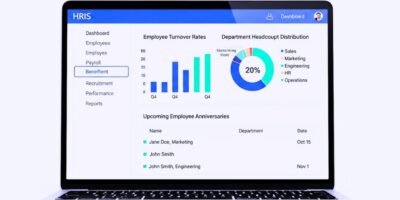Business Intelligence software has revolutionized how organizations process and analyze data to gain valuable insights into operations, customers, and market trends. As technology continues to evolve, so does the landscape of Business Intelligence Software. In this article, we will explore the future of Business Intelligence, including emerging trends and innovations that are shaping how businesses harness the power of data for informed decision-making and a competitive advantage.
AI and Machine Learning Integration
Artificial Intelligence (AI) and Machine Learning (ML) are transforming the BI landscape. These technologies enable BI tools to analyze vast amounts of data more efficiently and uncover hidden patterns and correlations. AI-powered Business Intelligence Software can automate data preparation and predictive analytics, generating real-time insights that provide businesses with a competitive edge by enabling faster and more accurate data-driven decisions.
With AI and ML integration, Business Intelligence Software can also learn from user interactions, adapt to changing business needs, and deliver personalized insights tailored to specific roles and responsibilities within the organization. This level of intelligence will significantly enhance the usability and effectiveness of BI solutions in the future.
Natural Language Processing (NLP) and Conversational BI
The future of Business Intelligence Software lies in its ability to democratize data access across the organization. Natural Language Processing (NLP) technology enables users to interact with BI tools using everyday language, making data analysis and exploration accessible to non-technical users. Conversational BI enables users to ask questions in natural language and receive immediate responses through visualizations or spoken language.
NLP-driven BI solutions will empower decision-makers at all levels to access real-time insights and perform complex analyses without requiring specialized technical skills. This trend will foster data-driven cultures and encourage broader adoption of BI throughout organizations.
Augmented Analytics
Augmented Analytics combines AI, ML, and NLP capabilities to automate data preparation, analysis, and visualization processes. BI tools with augmented analytics can automatically identify relevant data, detect anomalies, generate insights, and offer data-driven recommendations to users. This approach reduces the reliance on manual data manipulation and empowers users to focus on strategic decision-making.
Augmented Analytics will help organizations uncover valuable insights more efficiently, leading to faster and more accurate decision-making processes. Moreover, it will promote a data-driven mindset, enabling organizations to leverage their data assets for innovation and growth.
Mobile BI and Real-time Data
The future of BI is undoubtedly mobile. Mobile BI apps are gaining popularity, allowing users to access critical business information from their smartphones and tablets. In the future, Business Intelligence Software will continue prioritizing mobile-first design to accommodate the growing number of mobile users.
Real-time data analytics is another crucial aspect of the future of BI. Organizations require access to up-to-date information to respond promptly to shifting market dynamics. Business Intelligence Software will focus on delivering real-time dashboards and alerts, ensuring that decision-makers can act promptly based on the most current data available.
Data Storytelling and Data Visualization
Data visualization has been a key feature of Business Intelligence Software, enabling users to interpret complex data through interactive charts, graphs, and dashboards. In the future, data storytelling will become an integral part of BI solutions. Data storytelling combines data visualization with narrative elements to effectively communicate insights.
BI tools will emphasize building compelling data stories that provide context, explain trends, and offer actionable recommendations. Data-driven storytelling will make it easier for stakeholders to understand and act upon the insights gained from Business Intelligence Software.
Focus on Data Security and Privacy
As the volume of data grows, ensuring data security and privacy will remain critical concerns for businesses. Future Business Intelligence Software will implement robust security measures to safeguard sensitive information and comply with data protection regulations.
Additionally, with the increasing adoption of AI and ML in BI, there will be a need for ethical considerations regarding data usage and algorithm transparency. Organizations will prioritize openness, fairness, and accountability in their use of AI-driven BI solutions.
Conclusion
The future of Business Intelligence software is exciting and promising. With advancements in AI, ML, NLP, and data visualization, BI tools will become more accessible, intelligent, and user-friendly. Organizations will leverage the power of BI to gain deeper insights, make data-driven decisions, and stay ahead in an increasingly competitive business landscape.
Integrating AI and ML will enable automated data analysis and predictive capabilities, while NLP and conversational BI will democratize data access, encouraging wider adoption within organizations. Augmented Analytics will empower decision-makers with data-driven recommendations, and mobile BI will provide access to real-time insights on the go. By embracing these trends and innovations, businesses can unlock the full potential of their data, gain a competitive advantage, and thrive in an increasingly data-centric world.













